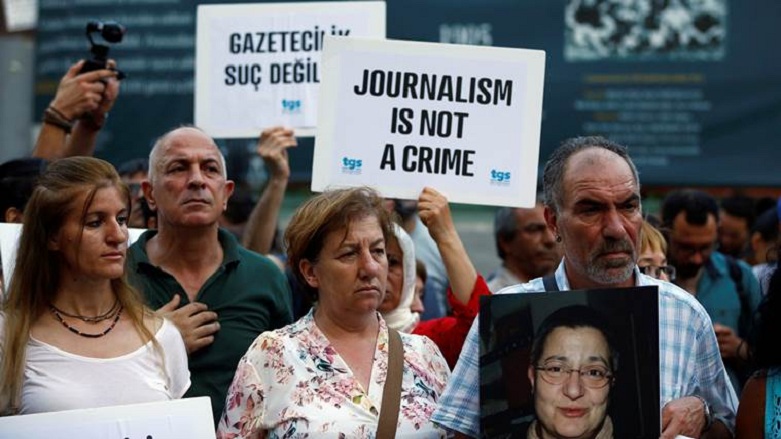Kurdish media decimated in Turkey: UN official

ERBIL, Kurdistan Region (Kurdistan24) – A United Nations official on Wednesday said the Kurdish media in Turkey was “decimated” by an ongoing government crackdown.
David Kaye, the UN Special Rapporteur on the promotion and protection of the right to freedom of opinion and expression, wrote in a commentary published by Reuters that Turkey’s government had launched a “widespread attack” on critical voices.
“It has closed at least 12 television and 11 radio stations. Kurdish media has been decimated. Web pages are regularly blocked, communications networks have been taken down, social media platforms censored,” said Kaye.
There were an estimated 155 journalists and media workers in prisons across Turkey.
Kaye visited Turkey at the invitation of the government between Nov. 14-18.
“[President Recep Tayyip] Erdogan himself has initiated some 1,900 defamation lawsuits, often solely on the basis of ironic, mocking, or even obnoxious social media posts,” added Kaye.
A latest such case was wired on Wednesday by Turkish news agencies, as an Ankara court fined a pro-Kurdish Peoples’ Democratic Party (HDP) lawmaker Ahmet Yildirim to 10,000 Turkish liras ($2,907 USD).
Yildirim was charged with “defaming [the] President’s personality,” based on a February speech he made in the Turkish Parliament.
In his preliminary on his conclusions, Kaye reported Turkey was imposing “draconian measures” on media.
In late October, a fortnight before Kaye’s mission in Turkey, authorities ordered the closure of 15 news outlets—a majority of them Kurdish.
Among them were Kurdish daily newspaper Azadiya Welat, Dicle news agency (DIHA), and the multilingual, all-women news agency JINHA.
A children’s TV that broadcast solely in Kurdish could not escape the crackdown, although that decision had since been reversed and the channel was expected to re-launch.
Kaye drew attention to the case of the writer and translator Necmiye Alpay who was arrested in late August along with Asli Erdogan, an accomplished novelist (with no relation to the President), for guest-editing the now closed pro-Kurdish Ozgur Gundem newspaper.
Prosecutors were threatening the two women with life in prison, reported Kaye who relayed Erdogan’s message in a letter because he was denied a visit to her that her detention was a “witch burning.”
Kaye mentioned he met judges who expressed “a deep commitment to the rule of law and bureaucrats who seemed genuinely committed to protecting their institutions.”
However, the UN rapporteur wrote he felt much of the government were merely implementing decisions made by the President and Prime Minister.
Editing by Karzan Sulaivany
